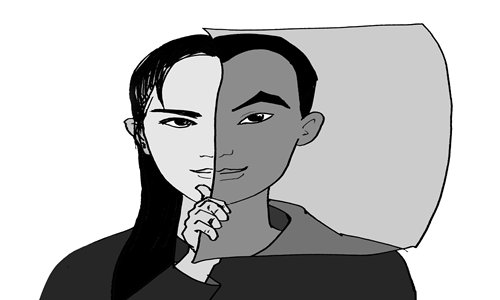
Illustration: Luo Xuan/GT
The news that Chinese actress Liu Yifei, also known as Crystal Liu, will star as Hua Mulan, a woman disguising herself as a man to join the army in her father's place and fight an invading enemy, in Disney's upcoming live-action movie Mulan has drawn cheerful responses from social media in China, with someone reportedly calling her the "the first Chinese Hollywood Princess."
The celebration, it should be noted, is of a personal victory for Liu rather than a long overdue validation of Asian acting talent. In the comment section of Disney Movies on Sina Weibo, China's Twitter, Liu's fans, joyous at the casting decision, didn't mention Hollywood did the right thing by not giving the role to a white actor.
That's not to say that Tinseltown was above reproach in racially dubious casting that involved Chinese characters.
In the 1944 movie Dragon Seed, based on the book by Pearl S. Buck, Katharine Hepburn played a Chinese girl by the name of Jade Tan. She was not the only Caucasian face in a story taking place in China. The movie's credited cast was comprised of foreigners dressed and made up as if they were Chinese.
Another movie that comes to mind is 55 Days in Peking released in 1963. Seeing Westerners play Chinese ministers, generals and eunuchs faced with the 1900 Boxer Rebellion against foreigners that look exactly like them, bar the costumes, is simply surreal, if not downright ludicrous.
While it could have been difficult to find recognizable, not to mention bankable, Chinese actors at the time to make the two movies more authentic, the specter of racial discrimination is readily visible. Both movies, featuring mostly white actors, portray their Chinese characters in the most unabashedly stereotypical way, with Hepburn's eyes being painfully sellotaped back to look convincingly slant-eyed.
A more recent and less racially offensive example of a white actor being cast in a role that apparently calls for a Chinese face is Matt Damon in The Great Wall (2016) directed by Zhang Yimou, a legendary Chinese director.
Intense criticisms about casting Damon as the protagonist swelled in the US, although his acting was nothing to write home about, claiming the decision amounted to "whitewashing."
Interestingly, Chinese were generally more tolerant about the casting of Damon than people in the US. The loudest Chinese complaint against Damon playing the leading role in the movie came from Constance Wu, an actress born in the US.
The lack of discontent from Chinese moviegoers is not that bizarre. Racial problems are not as prominent here in China as in the US and Chinese people are therefore less sensitive to racial discrimination, especially when it is not particularly obvious.
The Chinese audience and movie critics are not as primed to examine a movie's casting from a racial perspective because it's hard to name a US movie in recent memory that explicitly whitewashes a distinctly Chinese character (Damon didn't play a Chinese character, despite all the whitewashing accusations).
Since China is now the world's second-largest movie market, Hollywood has to be very careful about who plays whom in China-related movies. It's true that in Hollywood productions Chinese actors still mostly play marginal roles thrown in to boost box offices in China, but with many talented Chinese actors and ambitious Chinese movie companies eyeing the global stage, the situation could change soon, with Liu leading the charge.
This article was published on the Global Times Metropolitan section Two Cents page, a space for reader submissions, including opinion, humor and satire. The ideas expressed are those of the author alone, and do not represent the position of the Global Times.
